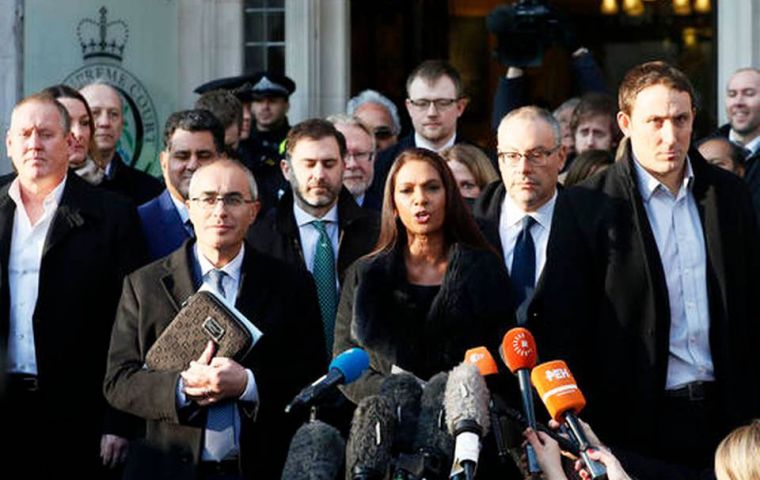MercoPress. South Atlantic News Agency
UK Supreme Court scheduled to make landmark ruling on Brexit
 Opponents say the government needs Parliament's approval to start the two years of Brexit negotiations.
Opponents say the government needs Parliament's approval to start the two years of Brexit negotiations. The United Kingdom Supreme Court will rule whether Parliament or ministers have the power to begin the Brexit process. The landmark judgment, to be announced early Wednesday will decide how the EU's Article 50 exit clause is triggered.
The government of PM Theresa May argues that ministers have the power - but opponents say they need Parliament's approval to start the two years of negotiations. If ministers lose the appeal, they will have to ask Parliament to vote on legislation which triggers Article 50.
The outcome of the Supreme Court case, heard by all 11 justices over four days in December, will not overturn the referendum result but determine which course towards leaving the EU is lawful.
Prime Minister May has said she wants to invoke Article 50 - formally notifying the rest of the EU of the UK's decision to leave - by the end of March, setting in train negotiations over the terms of the UK's exit.
Lord Neuberger, president of the Supreme Court, will read out a summary of the court's findings in a brief session expected to last five minutes. Members of the public are able to attend and will be allocated seats in the courtroom, as well as two adjacent rooms, on a first-come, first-serve basis from 09:00 GMT.
The full court ruling will then be published on the Supreme Court's website. T he case against the government was brought by investment manager Gina Miller and hairdresser Deir Tozetti Dos Santos




Top Comments
Disclaimer & comment rules-

-

-

Read all commentsForget CFK - for Christ's sake!! No wonder her speeches last 3 hours.
Jan 25th, 2017 - 07:36 am +3This is more fitting:
“As democracy is perfected, the office of president represents, more and more closely, the inner soul of the people. On some great and glorious day the plain folks of the land will reach their heart's desire at last and the White House will be adorned by a downright moron.”
H.L. Mencken, 1920
@Think
Jan 25th, 2017 - 06:50 pm +2Relax, I'm not asking you to research anything for me - not sure where you got that idea - only for your opinion.
About protectionism, the great majority of countries do still practice it in a minor form. Otherwise there would be no point to all these free trade deals or the EU single market. So the question is really whether a particular policy is a good idea or not. For example, you apparently think leaving the single market will be bad for the UK's economy. I think Trump's attempts to turn back the clock on US manufacturing jobs will just end up costing the country more in the long run.
But you didn't actually answer the question. The US is at the top of the 'Sociotechnoeconomic pyramid' and they have just changed their mind about Free Market Economic Policies. How does that fit with your theory?
And if you think the media 'died' in Kennedy's time, why do you still bother reading it and linking articles? You really don't think there is a difference since the rise of the internet?
I already knew they had very different views on immigration. But aren't there more differences than just that?
Jan 25th, 2017 - 01:38 pm +1Anyway, will you answer my two questions above about protectionism and the media?
Commenting for this story is now closed.
If you have a Facebook account, become a fan and comment on our Facebook Page!